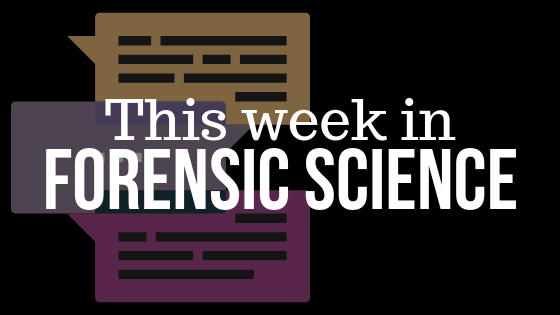No one has hours to scour the papers to keep up with the latest news, so we’ve curated the top news stories in the field of Forensic Science for this week. Here’s what you need to know to get out the door!
Omaha Police Get $1.9M Grant to Test Sexual Assault Kit Backlog (Forensic Magazine – 12/7/2018)
An estimated 1,500 sexual assault kits that were booked into evidence at the Omaha Police Department remain untested, but a $1.9 million federal grant aims to help clear the backlog.
The new funding from the national Sexual Assault Kit Initiative will allow the Nebraska State Patrol’s crime lab to test the kits starting this January.
‘The Double Helix’ at 50: Discovering DNA is Still a Miracle (Daily Beast – 12/8/2018)
- The most exciting book of 1968 was a nonfiction science page-turner that even today all but explodes your brain.
DNA Test Helps Mother Reunite With Daughter She Thought Died Nearly 70 Years Ago (The New York Times – 12/9/2018)
A DNA test has helped reunite a mother and daughter after nearly 70 years by uncovering a startling secret: A baby girl long thought to be dead was alive, and had been covertly adopted by a family in Southern California that lied about her origins.
Generalist Forensic Scientists Crucial to Crime Solving, Paper Argues (Forensic Magazine – 12/10/2018)
There can be too many experts focused solely on their own niches, stepping over one another and otherwise not understanding a directed judicious investigation, contends a new paper in the journal Science and Justice.
The general criminalist, who can see the overall picture of evidence identification and collection from crime scene to the crime lab, is vital to the future of forensic s
Why DNA Tourism May Be the Big Travel Trend of 2019 (NBC News – 12/9/2018)
Thanks to the availability of DNA testing it’s easier than ever before to actually trace that family tree. Armed with a new understanding of who they are and where they come from, people are flocking to their family’s homelands in such droves that this DNA travel, so to speak, landed on Lonely Planet’s list of Top Travel Trends for 2019.
‘I Wasn’t Sure We Would Ever Find Out’: How DNA, Genetic Genealogy Made 2018 the Year to Crack Cold Cases (ABC News – 12/10/2018)
Genetic genealogy only got on the public radar in April after the first public arrest through this DNA-and-family-tracing technique.
Since then, genetic genealogy has helped lead to 24 other suspect identification, according to genetic genealogy expert CeCe Moore.
California Sued Over DNA Database’s Inclusion of People Never Convicted of Felony (San Francisco Chronicle – 12/10/2018)
For police and prosecutors, a bigger database is a better one. But in the latest challenge, a pair of social justice groups on Monday sued the California Department of Justice over the state’s requirement that authorities collect and keep the DNA profile of anyone arrested for a felony, regardless of whether the person is convicted.
DNA Could ID Victims of Killing Fields (Patch – 12/11/2018)
League City police recently employed Virginia-based Parabon NanoLabs to determine the physical appearance and possible origin of the victims, using a new method of forensic DNA analysis called DNA phenotyping.
Digging for the Life Stories of Long-Forgotten Slaves (National Geographic – 12/11/2018)
- DNA researchers team up with Charleston’s Gullah Society to remember the dead and reveal the roots of the living.
Advanced DNA Technology May Help to Identify Korean War Unknowns (NPR – 12/12/2018)
The Pentagon is exhuming all of the more than 650 Korean War unknowns in a Honolulu military cemetery. Advances in DNA technology and other forensics make their identification highly likely.
Five States Tracking Rape Kits With New System (Forensic Magazine – 12/12/2018)
Nevada has now struck a deal to make it happen with STACS DNA and its Track-Kit, a cloud-based software system allowing all stakeholders to access the same system from different portals. It makes the Silver State the fifth and latest to adopt the tracking system—with other states in talks to potentially adopt the “turnkey” solution that brings states into compliance with demanding “rape kit” laws.
FBI Plans ‘Rapid DNA’ Network for Quick Database Checks on Arrestees (Washington Post – 12/13/2018)
However, the machines are not connected to CODIS, the FBI’s combined national DNA database. So the FBI is launching a Rapid DNA initiative to place the machines in police and sheriffs’ booking stations around the country, hoping to enable law enforcement to check arrestees against the CODIS database and, when matches are made to DNA from unsolved crimes, head off the release of the suspects.
How Case-Based Learning Can Build Enthusiasm for a Forensic Science Career (Forensic Magazine – 12/13/2018)
It is the responsibility of academic institutions and individual educators to create a learning atmosphere within classrooms that fosters a love for the sciences. The goal should be to encourage students to develop a passion for STEM at a young age and support their learning through high school and college, providing them with the tools needed to follow a pathway to a forensic science career.
WOULD YOU LIKE TO SEE MORE ARTICLES LIKE THIS? SUBSCRIBE TO THE ISHI BLOG BELOW!
SUBSCRIBE NOW!


